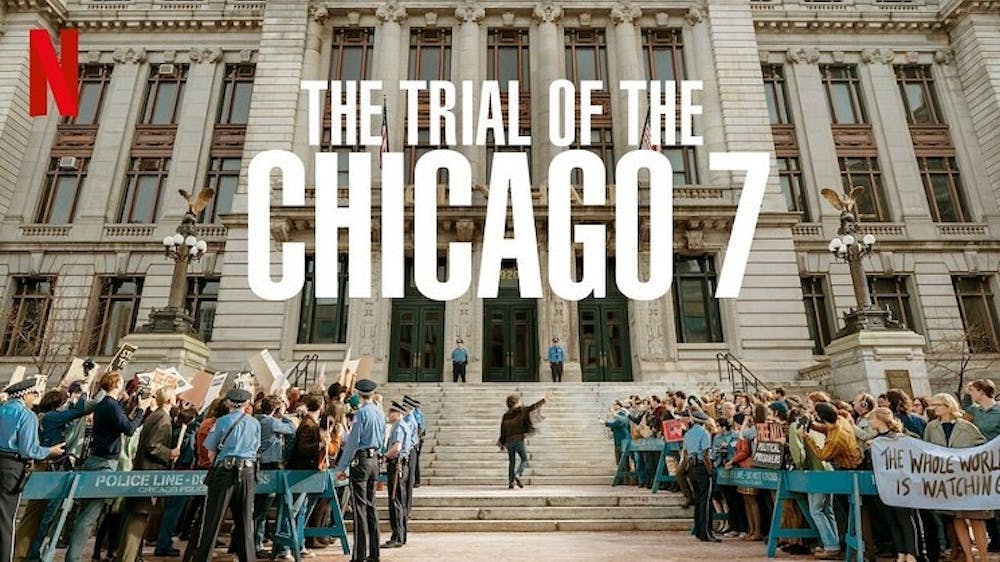Around an hour and a half into “The Trial of the Chicago 7,” clean-cut antiwar activist Tom Hayden (Eddie Redmayne, who, thankfully, doesn’t sing in this movie) stares down rabble-rouser Abbie Hoffman (Sacha Baron Cohen).
“My problem with you,” Hayden says, “is that for the next 50 years when people think of progressive politics they’re gonna think of you. They’re gonna think of you and your idiot followers passing out daisies to soldiers and trying to levitate the Pentagon. They’re not gonna think of equality or justice.”
Hoffman smarts off, asking if Hayden would have protested at the DNC if the recently assassinated Senator Robert F. Kennedy had been the nominee instead of Humbert Humphrey. Enraged, the two young men — who represent two very different sides of 1960s progressivism — engage in fisticuffs until their lawyer, William Kunstler (Mark Rylance of “Wolf Hall” and “Bridge of Spies”), bursts into the room.
This dramatic tête-à-tête raises questions. What exactly does it mean to be an American progressive? Is it necessary to play inside our democratic system and to engage with our government instead of tearing it down, or should we express political grievance in a more radical way, rejecting the status quo of liberalism and the very notion that our country is a democracy? And, is it that these two lifestyles are mutually exclusive, or is there a way that activists can unite them to build a better United States?
Aaron Sorkin’s new Netflix film, set during the aftermath of the riots at the 1968 Democratic National Convention and based on a true story, begins after the violent clashes between protesters of the Vietnam War and the Chicago Police Department. Richard Nixon has just been elected president, and newly-appointed Attorney General John Mitchell (John Doman) wants revenge on his predecessor, Ramsay Clark (Michael Keaton). Clark breaks protocol by refusing to resign his position until one hour before Mitchell was sworn in.
In retaliation, Mitchell orders federal prosecutor Richard Schultz (Joseph Gordon-Levitt) to try seven anti-war protest leaders for crossing state lines to incite violence, belittling a report that the previous administration’s Justice Department authored — which had concluded that Chicago’s violence was mainly the fault of the police. And to make the mostly-white jury less sympathetic to the activists, the Justice Department adds Black Panther Party National Chairman Bobby Seale (Yaha Abdul Mateen) to the list of defendants, although Seale was not even in Chicago during the riots.
The trial, overseen by Judge Julius Hoffman (Frank Langella) was a real-life travesty of justice and an outright circus. The film deftly captures some of the event’s most wild episodes, both comedic and terrible. In one scene, Hoffman (the activist, not the judge) arrives at the witness stand in black robes, which Hoffman (this time, the judge) asks to be removed. The activist reveals a policeman’s outfit underneath the robes with a badge that reads “pig.” In a more gruesome scene, U.S. marshals beat, gag and enchain Seale, the trial’s sole Black defendant. Frank Langella’s character constantly refers to Seale as “The Black Panther” with just a hint of a pause before the word “Panther,” not even bothering to conceal his racism.
And all of this is set to the music of Sorkin’s dialogue, a manner of speech which fans of “The West Wing” and “The Newsroom” know well: it's zippy, smart and brimming with sincerity. Some critics dismiss Sorkin’s writing style as unrealistic. Earthlings, they argue, don’t actually respond to prosecutorial questions with replies like “I’ve never been on trial for my thoughts before.” These skeptics, however, don’t appreciate that Sorkin has always been more hyper-realist than realist. Eloquent as they are, his characters give off plain and true emotions, and they reserve their wittiest tirades for when they’re in strong, almost transcendent states of anger or joy. This film rollicks from beginning to end, and it's largely because of the beauty of its language.
I’m from Minneapolis, and while watching this movie I remembered the protesters who were tear gassed this summer, just blocks away from my home. I saw the National Guard trucks that were seemingly everywhere, and I watched the Third Precinct burn in my city. Any viewer of this film who has a soul will be outraged by the modern parallels that this film draws, with its unblinking portrayal of the Chicago Police Department’s brutality and the sheer loathing that motivated the Nixon administration's persecution of the main characters. Go to Netflix, see this outstanding film — and vote.
Reel Critic: ‘The Trial of the Chicago 7’

Comments



